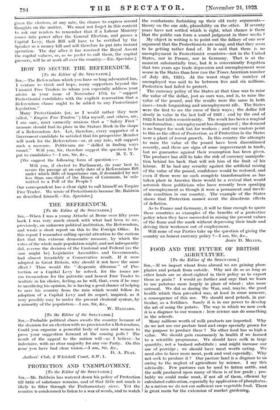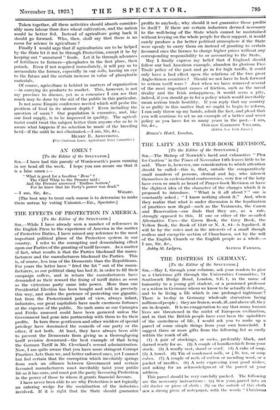FOOD AND THE FUTURE OF BRITISH AGRICULTURE.
[To the Editor of the SPECTATOR.] SIR,—If we import wheat from abroad we are gaining phos- phates and potash from outside. Why not do so as long as other lands are so short-sighted in their policy as to export them as grain ? I would go further and urge that we learn to use potatoes more largely in place of wheat ; also more oatmeal. We did so during the War, and, maybe, the good health which then prevailed was, at least in some measure, a consequence of this use. We should need potash, in par- fielder, as a fertilizer. Surely it is in our power to develop the art of using the potato. The way in which we now cook it is a disgrace to our women : here science can do something in the schools.
Many millions worth of milk products are imported. Why do we not use our pasture land and crops specially grown for the purpose to produce these ? No other food has so high a value. We should gain enormously in health if we farmed to a scientific programme. We should have milk in large quantity, not a bastard substitute ; and might increase our use of porridge ; we should have meat worth eating. We need also to have more meat, pork and veal especially. Why not seek to produce it ? Our pasture land is a disgrace to us owing to the. neglect of agriculture by science. I say this advisedly. Few pastures can be used to fatten cattle, and the milk produced upon many of them is of low grade ; pro- bably we could make most, if not all of them, efficient by calculated cultivation, especially by application of phosphates. As a nation we do not eat sufficient raw vegetable food. There is great room for the extension of market gardening.
Taken together, all these activities should absorb consider- ably more labour than does wheat cultivation, and the nation would be better fed. Instead of agriculture going back it should go forward. Who, then, shall say that there is no room for science in agriculture ? Finally I would urge that if agriculturists are to be helped by the State let it not be through Protection, except it be by keeping out " unnatural " foods. Let it be through advances of fertilizers to farmers—phosphates in the first place, then potash. Even if not required immediately, it will pay us to accumulate the former, especially in our soils, having an eye to the future and the certain increase in value of phosphatic materials.
Of course, agriculture is behind in matters of organization —in carrying its products to market. This, however, is not my province to discuss, yet as a consumer I can see that much may be done by the aid of the public in this particular.
Is not some Empire conference needed which will probe the problem of food to its utmost depth ? Even including the question of users ? Our population is excessive, and, like our food supply, is to be improved in quality. The agricul- turist could treat the subject better than anyone else as he is aware what happens if no selection be made of the breeding herd—if the unfit be not eliminated.—I am, Sir, &e., HENRY E. ARMSTRONG.
(Vice-Chairman Lanes. Agricultural Trust Committee.)



















































 Previous page
Previous page